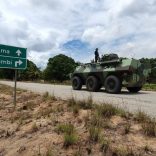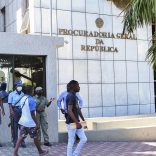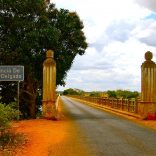Mozambique: Terrorism affected over 134,000 people in May- AIM
Mozambique: Islamic leader denies moslems linked to terror attacks – AIM report

File photo
The chairperson of the Islamic Community of Mozambique, imam Abdul Rashid, has denied that the religion of Islam has anything to do with the acts of terrorism in parts of the northern Mozambican province of Cabo Delgado.
Interviewed by the independent television station STV, Rashid said “I don’t believe moslems are involved in this. When I say ‘moslems’, I’m talking about those who practice the Islamic religion, because there may be those who call themselves moslems, but who do not practice the religion. That’s their personal matter”.
“We know the moslems of the north, particularly in Cabo Delgado”, he continued. “We have our activities there, we know them, and they are peaceful people who have nothing to do with all this confusion”.
“This is something that comes from outside”, said Rashid, “and they are using some Mozambicans of bad faith, creating this situation which should in no way be associated with the moslem religion”.
“These are outside forces that are coming here, and I think our government should pay attention to this”, he insisted.
Rashid blamed the emergence of terrorist groups on financial issues, rather than on religious fundamentalism. “There’s a lot of wealth in the soil of Cabo Delgado, and this must be one of the causes”, he argued. “The idea is to create confusion so that they can exploit this wealth at will, while the government is perhaps distracted, accusing moslems, when moslems have nothing to do with it”.
However, there is no doubt that members of the group known in Cabo Delgado as “Al-Shabaab” consider themselves moslems, and that orthodox moslem leaders in the province warned the government of the emergence of fundamentalist groups well before the outbreak of terrorist attacks in Mocimboa da Praia district last October. The warnings were not taken seriously.
The only serious study undertaken so far of this group found that they began operations in Cabo Delgado first as a religious organisation, but decided to set up military cells as from late 2015. The study, drawn up by Muslim cleric Sheik Saide Habibe, and researchers Joao Pereira and Salvador Forquilha, and entitled “Islamic radicalisation in northern Mozambique: the case of Mocimboa da Praia”, also found that the group’s leaders have links (religious, military and commercial) with fundamentalist groups in Somalia, Kenya, Tanzania and the Great Lakes region. They differentiate themselves from the orthodox moslems of Cabo Delgado by adopting a distinctive dress – white turbans, shaved heads, long beards, and black shorts.
The group claims that mainstream Mozambican mosques have abandoned the teachings of the prophet Mohammed and are a degenerate form of Islam. They refuse to send their children to official schools, and refuse to enter into any dialogue with Mozambican state bodies or with the local religious leaderships.
Rashid also claimed that a solution could not be found solely by the military response to the attacks by the Mozambican defence and security forces, but only by understanding the causes of the insurgency.
He criticised the closure of certain mosques in Cabo Delgado associated with the fundamentalists (although at least three of these mosques have subsequently re-opened).
“Closing the mosques won’t solve anything”, Rashid said. “Harassing careless and innocent moslems won’t get you anywhere. On the contrary, it will create bad feelings among moslems”.













Leave a Reply
Be the First to Comment!
You must be logged in to post a comment.
You must be logged in to post a comment.